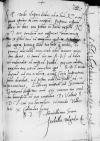List #953
Isabel DELGADA do Ioannes DANTISCUSValladolid, [1537]-05-22
| odebrano [1537]-10-07 Rękopiśmienne podstawy źródłowe:
Pomocnicze podstawy źródłowe:
Publikacje:
| ||||||||||||
Tekst + aparat krytyczny + komentarz Zwykły tekst Tekst + komentarz Tekst + aparat krytyczny
Reverendissimo Domino, domino
Salutem plurimam.
Dedi elapsis diebus ad te cf.
Reverendissimam Dominationem Tuam oro, tandem nos respiciat memineritque me et
Et valeat Reverendissima Dominatio Tua. Cui me humiliter commendo.
Reverendissimae Dominationis Tuae humillima serva


 BK, 230, p. 262
BK, 230, p. 262